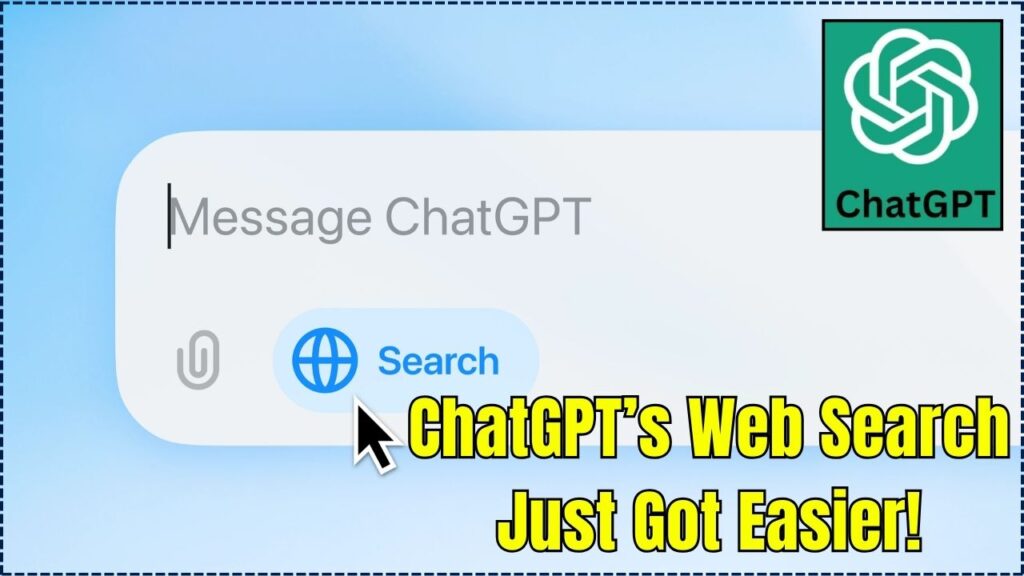
ChatGPT’s Web Search Just Got Easier: OpenAI has recently announced a major update to its ChatGPT web search feature, removing the requirement for users to log in to access it. This move significantly enhances accessibility, allowing users to utilize ChatGPT’s search capabilities without creating an account. Previously, ChatGPT’s search feature was restricted to logged-in users, with priority given to paid subscribers. Now, with this barrier removed, OpenAI aims to make AI-powered search more inclusive and user-friendly.
The update brings ChatGPT’s search closer to traditional search engines like Google and Bing, enabling anyone to ask questions and receive real-time web-based responses without signing in. This marks a significant shift in AI-assisted search and has the potential to reshape how users interact with web-based information.
ChatGPT’s Web Search Just Got Easier
| Feature | Details |
|---|---|
| Update | ChatGPT web search now available without login |
| Announced By | OpenAI |
| Effective Date | February 2025 |
| Accessibility | Available to all users via chatgpt.com |
| Search Features | Real-time web browsing, AI-generated summaries, source citations |
| Comparison to Google | Provides AI-powered answers instead of ranked search results |
| Login Requirement | No longer needed for web search on desktop |
| Mobile App Access | Login still required for full features |
| Future Developments | Potential expansion to mobile, voice search integration |
OpenAI’s decision to remove the login requirement for ChatGPT’s web search makes AI-powered search more accessible and user-friendly. By eliminating account barriers, ChatGPT is now a direct competitor to traditional search engines, offering real-time, AI-generated answers without requiring users to sift through multiple links.
While Google remains dominant, ChatGPT’s instant AI search capabilities offer a new way to access information—fast, intuitive, and login-free. As OpenAI continues to improve search technology, users can expect even more advanced AI-driven search experiences in the near future.
What This Means for Users
The removal of the login requirement for ChatGPT’s web search has several implications for users, making it a more accessible and competitive search option. Here’s how this change benefits the public:
1. Instant Access to AI-Powered Search
- Users can now access ChatGPT’s real-time search function instantly, without needing to create an account.
- This reduces friction for casual users who want quick answers without signing up.
2. ChatGPT as a Google Competitor
- Unlike traditional search engines that present a list of links, ChatGPT provides AI-curated answers with contextual summaries.
- This shift could challenge Google’s dominance by offering a more conversational and direct approach to search.
3. More Inclusive AI for Everyone
- Previously, only registered users (and initially, paid subscribers) could use web search.
- Now, anyone can use it, making AI-generated knowledge more widely accessible.
4. No More Data Tracking Concerns
- Without the need to log in, casual users may feel more comfortable using ChatGPT search without concerns about data tracking.
- OpenAI has not disclosed whether it will collect anonymous usage data.
How ChatGPT’s Search Feature Works
The AI-powered web search feature in ChatGPT is designed to fetch and summarize information in real-time. Here’s how it operates:
- Enter Your Query: Users can type any question or topic into ChatGPT’s search bar.
- AI Fetches Real-Time Web Data: Unlike pre-trained AI models, ChatGPT’s web search,
- Accesses current online information
- Uses multiple reliable sources
- Summarizes key points into an easy-to-read response
- AI Provides a Clear Summary:
- Instead of displaying a list of ranked web pages like Google, ChatGPT generates a concise answer.
- The response includes citations linking to original sources for verification.
- Users Can Ask Follow-up Questions: Unlike a traditional search engine, ChatGPT allows users to refine or expand their search without starting over.
Comparing ChatGPT’s Search to Google and Bing
| Feature | ChatGPT Web Search | Google Search | Bing AI Search |
|---|---|---|---|
| Account Requirement | No login needed | No login needed | Login required for AI responses |
| Response Format | AI-generated summaries | Ranked search results | AI + traditional search |
| Source Citations | Yes | No (except for featured snippets) | Yes |
| Real-Time Web Search | Yes | Yes | Yes |
| Follow-Up Queries | Conversational | Separate searches | Conversational |
Key Takeaways
- ChatGPT removes the need for users to sift through links, offering instant AI summaries.
- Unlike Google, which ranks websites, ChatGPT compiles AI-driven answers.
- Unlike Bing’s AI, which requires login for full features, ChatGPT now provides open access.
$1000 Monthly Checks For Everyone In December 2024 – Know Eligibility
$3000 IRS Tax Refund 2024: Check Amount, Eligibility & Payment Date
$3,000 Deposit for SSI, SSDI, and VA Recipients in January 2025 – Check Important Details
What’s Next for OpenAI’s Search Capabilities?
With this major update, OpenAI is likely to explore additional enhancements to its search functionality, including:
1. Mobile Web Search Expansion
- Currently, the ChatGPT mobile app still requires login.
- Future updates may extend anonymous search to mobile devices.
2. Voice Search & AI Assistance
- OpenAI may integrate voice-enabled search to allow users to interact hands-free.
- This could position ChatGPT as an AI-powered alternative to Google Assistant and Siri.
3. Personalized Search Results
- Future iterations could introduce customized AI responses based on user behavior (opt-in basis).
4. AI-Generated News Summaries
- ChatGPT could expand into news summarization, offering quick real-time updates on trending topics.
FAQs On ChatGPT’s Web Search Just Got Easier
Q1: Can I use ChatGPT’s web search without an account now?
Yes! OpenAI has removed the login requirement, allowing anyone to access ChatGPT’s search feature without signing in.
Q2: Is ChatGPT’s search better than Google?
ChatGPT provides AI-generated summaries instead of traditional ranked search results. It’s better for quick answers but lacks deep research tools like Google Scholar.
Q3: Will my data be tracked if I use ChatGPT’s search?
Since no login is required, OpenAI may limit personal data collection, but details on anonymous usage tracking have not been disclosed.
Q4: Can I still log in for personalized AI interactions?
Yes. Logging in provides access to past searches, AI memory, and conversation history.
Q5: Will OpenAI expand this feature to mobile devices?
Currently, mobile users must log in for full features, but OpenAI may expand open access in future updates.








